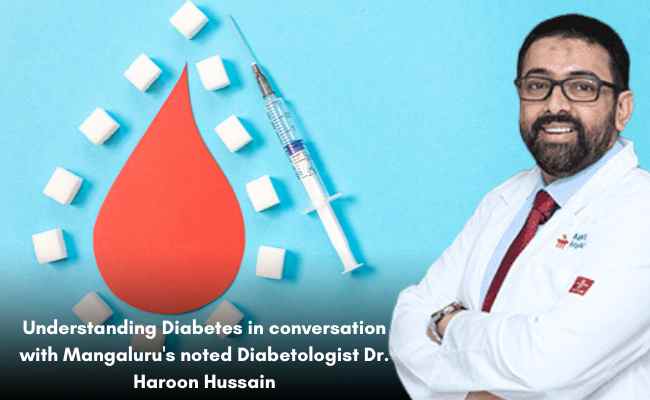Mangaluru: As the world commemorates World Diabetes Day on November 14, 2023, the spotlight is once again on the global battle against a silent but formidable adversary – diabetes. In the pursuit of spreading awareness about this chronic condition that affects millions worldwide, we had the privilege of sitting down with one of Mangaluru's most reputed physicians and diabetologists, Dr. Haroon Hussain. As a Consultant in Internal Medicine and Diabetology at KMC Hospital, Mangaluru, Dr. Haroon brings a wealth of experience and expertise to the forefront of diabetes care.
World Diabetes Day serves as a reminder of the urgency to address the growing prevalence of diabetes and its complications. According to the International Diabetes Federation, an estimated 537 million people will be living with diabetes by 2035 if the current trends persist. The importance of awareness cannot be overstated, as timely intervention, lifestyle modifications, and early diagnosis can significantly alter the trajectory of this condition.
In our exclusive interview with Dr. Haroon, we delved into the core principles of diabetes management and the crucial role of awareness in fostering a healthier community. Throughout our discussion, Dr. Haroon emphasized key factors such as lifestyle modification, maintaining a healthy way of life, regular exercise, and the significance of routine testing for early diagnosis.
In the following excerpts, we explore Dr. Haroon's insights on the pivotal aspects of diabetes management, shedding light on how a proactive approach can not only mitigate the risks associated with diabetes but also enhance the overall well-being of individuals.
Q: What is the significance of World Diabetes Day?
Dr. Haroon: World Diabetes Day holds immense significance, especially in a country like ours, where diabetes has reached alarming proportions. India, sadly, has earned the title of the 'diabetes capital of the world.' It's disheartening to note that nearly 50% of the people with diabetes are unaware of their condition, living in the shadows of this silent epidemic.
November 14 is chosen for World Diabetes Day because it marks the birthday of Sir Frederick Banting, the co-discoverer of insulin, a life-saving hormone for those with diabetes. The World Health Organization (WHO) spearheads this global initiative to raise awareness about diabetes, emphasizing the need for early detection and effective management.
As we speak, one in every ten individuals is grappling with diabetes. The theme for World Diabetes Day this year, 'Empowering Global Health,' underscores the collective effort required to combat this growing health concern. Empowerment, in this context, involves spreading awareness, encouraging lifestyle modifications, and fostering a sense of responsibility in managing one's health.
The goal is clear – to reach the undetected, to educate, and to empower individuals to take charge of their health. By doing so, we can collectively work towards a healthier and diabetes-aware society.
Q: What is diabetes?
Dr. Haroon: Diabetes, in essence, is a metabolic disorder, a condition that affects how our bodies use the food we consume for energy. Our bodies break down the food into a sugar called glucose, which serves as the primary source of energy. Now, here's the catch – our bodies already have sugar present in them, and it's a normal and necessary component for energy production.
The magic happens in the pancreas, a small organ nestled behind our stomach. The pancreas is like our body's personal chef, producing a hormone called insulin. Think of insulin as the key that unlocks the doors of our cells, allowing glucose to enter and be utilized for energy.
However, in individuals with diabetes, there's a glitch in this well-orchestrated system. Either the pancreas isn't producing enough insulin, or the insulin produced is not as effective as it should be. This results in an accumulation of glucose in the blood, leading to elevated blood sugar levels. It's like having a key that doesn't quite fit the lock, causing chaos in the balance of our body's energy management.
Understanding diabetes, therefore, is about recognizing this disruption in the delicate dance between insulin and glucose. It's about finding ways to restore this balance, whether through medications, lifestyle changes, or a combination of both, to ensure that the body's energy distribution stays harmonious.
Q: What are the types of diabetes?
Dr. Haroon: Diabetes comes in different types, and understanding them is crucial for effective management. We primarily have three types:
1. Type 1 Diabetes: This occurs when the immune system mistakenly attacks and destroys the insulin-producing cells in the pancreas. People with Type 1 diabetes need to inject insulin to survive.
2. Type 2 Diabetes: This is more common and typically develops when the body doesn't produce enough insulin or can't use it effectively. It is often associated with lifestyle factors such as diet and exercise.
3. Gestational Diabetes: This type affects some pregnant women, causing high blood sugar levels. While it usually resolves after childbirth, it requires careful management during pregnancy to avoid complications for both the mother and the baby.
Each type requires a tailored approach to management, emphasizing the importance of personalized care in dealing with diabetes.
Q: Can diabetes be inherited by parents?
Dr. Haroon: Yes, there's truth to the common belief that diabetes can run in families. The predisposition to diabetes can be inherited, making individuals more susceptible. However, it's not a straightforward inheritance like passing down eye color.
Type 1 diabetes has a genetic component, and if a parent has it, there's a slightly increased risk for the child. In Type 2 diabetes, genetics play a role, but lifestyle factors also significantly contribute. Families may share dietary habits and exercise routines, influencing the likelihood of developing Type 2 diabetes.
It's essential to understand that while genetics can set the stage, lifestyle choices can either trigger or delay the onset of diabetes.
Q: What are the symptoms of diabetes? Which group of people should often and repeatedly go for testing?
Dr. Haroon: The symptoms of diabetes can vary, and some individuals may not experience noticeable signs. However, common symptoms include:
1. Frequent Urination: An increase in urine production.
2. Excessive Thirst: Feeling unusually thirsty and drinking more fluids than usual.
3. Unexplained Weight Loss: Despite regular eating habits, experiencing weight loss.
4. Increased Hunger: Feeling hungrier than usual, especially after eating.
5. Fatigue: Persistent tiredness and lack of energy.
6. Blurred Vision: Changes in vision quality.
7. Slow Healing: Wounds and sores taking longer to heal.
Testing for diabetes is especially crucial for certain groups:
1. Family History: Individuals with a family history of diabetes are at a higher risk.
2. Age: As we age, the risk of developing diabetes increases, making regular testing important, especially after 45.
3. Overweight or Obesity: Excess weight, especially around the abdomen, is a risk factor.
4. Physical Inactivity: A sedentary lifestyle raises the risk of diabetes.
5. Ethnic Background: Certain ethnic groups, such as South Asians, African Americans, Hispanic/Latino Americans, and Native Americans, are at a higher risk.
Regular testing for blood sugar levels is crucial for early diagnosis, allowing timely intervention and management to prevent complications associated with diabetes.
Q: What are the short term and long term complications associated with diabetes?
Dr. Haroon: Diabetes can lead to both short-term and long-term complications.
Short-term Complications
1. Hypoglycemia (Low Blood Sugar): Caused by a sudden drop in blood sugar, it can result in dizziness, confusion, and, in severe cases, unconsciousness.
2. Hyperglycemia (High Blood Sugar): Can lead to symptoms like increased thirst, frequent urination, and fatigue.
Long-term Complications:
1. Cardiovascular Issues: Diabetes increases the risk of heart disease and stroke.
2. Kidney Damage: Known as diabetic nephropathy, it can lead to kidney failure.
3. Eye Problems: Including diabetic retinopathy, which can result in vision loss.
4. Nerve Damage: Peripheral neuropathy can cause pain and numbness in extremities.
5. Foot Complications: Diabetes can lead to infections and ulcers, potentially requiring amputation.
To avoid complications:
1. Maintain Healthy Blood Sugar Levels: Regular monitoring and adherence to prescribed medications.
2. Healthy Lifestyle: A balanced diet, regular exercise, and weight management are crucial.
3. Regular Check-ups: Keep up with medical appointments for comprehensive health assessments.
4. Foot Care: Regularly check and care for feet to prevent complications.
Q: What are the criteria used for diagnosis of diabetes?
Dr. Haroon: The diagnosis of diabetes involves several criteria:
1. Fasting Blood Sugar Test: A fasting blood sugar level of 126 milligrams per deciliter (mg/dL) or higher indicates diabetes.
2. Oral Glucose Tolerance Test (OGTT): A blood sugar level of 200 mg/dL or higher two hours after drinking a glucose solution suggests diabetes.
3. Hemoglobin A1c Test: An A1c level of 6.5% or higher indicates diabetes.
4. Random Blood Sugar Test: A blood sugar level of 200 mg/dL or higher, along with symptoms, may indicate diabetes.
It's essential to consider multiple factors and perform tests under various conditions to ensure an accurate diagnosis. If you experience symptoms or fall into high-risk categories, you should consult a healthcare professional for appropriate testing.
Q: Why should pregnant women be concerned and take care about Diabetes?
Dr. Haroon: Pregnant women should be concerned about diabetes due to a condition known as Gestational Diabetes. This temporary form of diabetes can develop during pregnancy and poses risks for both the mother and the baby.
Complications may include:
1. Increased Risk of Type 2 Diabetes: Women with gestational diabetes have a higher risk of developing Type 2 diabetes later in life.
2. Complications for the Baby: Higher chances of excessive birth weight, premature birth, and increased risk of developing Type 2 diabetes in the future.
3. Maternal Health Risks: Gestational diabetes increases the risk of high blood pressure and the need for a cesarean section.
Regular monitoring, a healthy diet, and appropriate medical care during pregnancy are crucial to manage gestational diabetes effectively and ensure the well-being of both the mother and the baby.
Q: What is your advice on lifestyle modification and exercise?
Dr. Haroon: Lifestyle modification is at the forefront of diabetes management. Here are key recommendations:
1. Healthy Diet: Focus on a balanced diet rich in fruits, vegetables, whole grains, and lean proteins. Limit intake of processed foods and sugary beverages.
2. Regular Exercise: Aim for at least 150 minutes of moderate-intensity exercise per week. This can include brisk walking, cycling, or other activities you enjoy.
3. Weight Management: Maintain a healthy weight through a combination of diet and exercise. Even a modest weight loss can have significant benefits for diabetes management.
4. Regular Monitoring: Keep track of blood sugar levels as advised by your healthcare provider. This helps in understanding how lifestyle changes impact your condition.
5. Stress Management: Practice stress-reducing techniques such as meditation or yoga, as stress can affect blood sugar levels.
Remember, small, sustainable changes can make a significant difference.
Q: What are your dietary advices for diabetic patients?
Dr. Haroon:
1. Balanced Meals: Opt for balanced meals with a mix of carbohydrates, proteins, and healthy fats to help manage blood sugar levels.
2. Portion Control: Be mindful of portion sizes to avoid overeating, which can impact blood sugar levels.
3. Complex Carbohydrates: Choose whole grains, legumes, and vegetables for complex carbohydrates that release energy gradually.
4. Limit Added Sugars: Minimize the intake of sugary foods and beverages, opting for natural sweetness from fruits when needed.
5. Lean Proteins:Include lean protein sources like poultry, fish, tofu, and legumes to support muscle health.
6. Healthy Fats: Opt for sources of healthy fats, such as avocados, nuts, and olive oil, while limiting saturated and trans fats.
7. Fiber-Rich Foods: Foods high in fiber, like fruits, vegetables, and whole grains, aid digestion and help manage blood sugar levels.
Q: People tend to eat a lot of junk food and sugar while they are stressed and or happy to celebrate. How does ot effect diabetes and how to cut it down?
Dr. Haroon: Eating junk food and excessive sugar during times of stress or celebration can have significant implications for diabetes:
1. Blood Sugar Spikes: Processed foods and sugary treats can lead to rapid spikes in blood sugar levels, challenging diabetes management.
2. Weight Gain: Regular indulgence in unhealthy foods contributes to weight gain, a factor that exacerbates diabetes.
To cut down on these habits:
1. Mindful Eating: Be conscious of what and how much you're eating. Savor the flavors, and avoid distractions while eating.
2. Healthy Alternatives: Opt for healthier snacks like nuts, fruits, or yogurt. Choose whole-grain options for a satisfying and nutritious choice.
3. Emotional Awareness: Find alternative ways to cope with stress or celebrate that don't involve food. Exercise, meditation, or spending time with loved ones can be effective stress relievers.
4. Moderation: It's okay to enjoy occasional treats, but moderation is key. Balance indulgences with healthier choices.
By a mindful approach to eating and making conscious food choices, individuals with diabetes can better manage their condition and overall well-being.
Q: If I have diabetes, should I be worried?
Dr. Haroon: While diabetes requires careful management, there's no need for excessive worry. With the right lifestyle modifications, medication adherence, and regular monitoring, many individuals with diabetes lead healthy, fulfilling lives. Consult with your healthcare team for personalized guidance and support to effectively manage your condition. Remember, proactive management empowers you to take control of your health.
Q: There is a belief that "sugar is the new smoking," do you agree with it?
Dr. Haroon: I concur with the notion that 'sugar is the new smoking.' While both smoking and diabetes pose significant health risks, diabetes, in particular, can impact various organs through its effects on blood vessels. The pervasive nature of diabetes, affecting the heart, kidneys, eyes, and more, underscores its wide-reaching impact on overall health. Recognizing the parallels between excessive sugar consumption and the detrimental effects of smoking reinforces the urgency of adopting healthier lifestyles to safeguard our well-being.
Conclusion:
In our conversation with Dr. Haroon Hussain, we've navigated the intricate landscape of diabetes, shedding light on its nuances and the critical importance of awareness. As we mark World Diabetes Day on November 14, 2023, the message is clear – diabetes is a challenge, but armed with knowledge and a proactive approach, it can be effectively managed.
Dr. Haroon's emphasis on lifestyle modification, regular exercise, and the significance of early detection resonates as a beacon of hope for those grappling with diabetes. The journey towards better health involves not just medical interventions but a holistic commitment to well-being.
Let World Diabetes Day serve as a reminder that awareness is the cornerstone of effective diabetes management. Empowered with the right information, individuals can make informed choices, navigate lifestyle changes, and embrace a future where diabetes doesn't dictate but is managed with resilience and determination.
As we move forward, let Dr. Haroon's insights inspire a collective effort towards a healthier, diabetes-aware society. The journey begins with awareness, continues with education, and thrives with a shared commitment to nurturing health on every front.
Let the Truth be known. If you read VB and like VB, please be a VB Supporter and Help us deliver the Truth to one and all.
Lucknow (PTI): The Uttar Pradesh Congress on Wednesday staged a statewide protest demanding a fair and transparent inquiry into the FIR lodged against Swami Avimukteshwaranand Saraswati and those who filed the complaint against him.
In a statement issued here, the party said memorandums addressed to Prime Minister Narendra Modi were submitted through district magistrates in all districts of the state.
Uttar Pradesh Congress spokesperson Manish Hindvi told PTI that the memorandums were handed over through the district administration in all 75 districts.
In the memorandum, the party alleged that Saraswati and his disciples were "unnecessarily harassed and humiliated" by police on the occasion of Amavasya and were prevented from taking a ritual bath (at the Magh Mela). It further alleged that some disciples were manhandled and taken to a police station.
The memorandum also claimed that an FIR was later registered against Saraswati, his disciple Swami Mukundanand Brahmachari and several unidentified persons in a sexual harassment case. It termed the case a "conspiracy" aimed at tarnishing the seer's reputation.
Citing Articles 25 and 26 of the Constitution, the memorandum stated that these provisions guarantee religious freedom and the right of religious denominations to manage their own affairs.
It described the position of shankaracharya held by Saraswati as "one of the highest spiritual posts in Sanatan tradition" and alleged that the entire episode appeared to have been "orchestrated in a planned manner".
"We request that the background of the persons who got the FIR registered be investigated in a transparent manner by a retired high court judge and strict action be taken against them," the memorandum said.
It also sought a "fair and transparent probe" into the allegations levelled against Saraswati so that the truth could be established.
Earlier, Uttar Pradesh Congress president Ajay Rai had told reporters in Varanasi after meeting Saraswati that the party stood firmly with him.
The Congress said it would continue to press for an impartial inquiry into the entire episode.
On February 21, an FIR was lodged in Prayagraj against Saraswati and his disciple Mukundanand Brahmachari on charges of sexually abusing two persons, including a minor, over the past year at a gurukul and religious congregations, including the recently concluded Magh Mela.
Days after he was booked, Saraswati had said on Monday that he would not oppose his arrest and asserted that the "fabricated story" would be exposed sooner or later.
At a press conference on Wednesday, Saraswati alleged that criminals rule in Uttar Pradesh, level allegations and influence investigations, as he denied having any contact with the two persons for whose alleged sexual abuse he has been booked.



_vb_77.jpeg)
_vb_00.jpeg)
